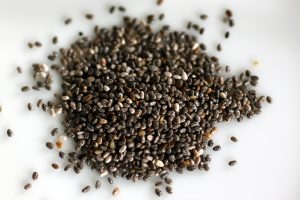Updated 03-Aug-2025

Personally, I see the chia seeds fad as just that. However, there is some science to the purported benefits of chia seeds. One thing to note is that human studies do not show benefits when adding chia seeds as a supplement, but only as a part of a diverse plant-based diet (that is, adding chia seeds won't provide benefits but switching to a nutritious, plant-based diet which can include chia seeds, does show benefit.
Chia Seeds are a Superfood
The term superfood is ridiculous. What is generally meant is that a food is either a complete food and / or a functional food.
In the case of chia seeds, they are a complete protein containing all nine essential amino acids that cannot be made in the body.
Also, chia seeds are seen as a functional food, that is they perform functions beyond nutrition, such as lowering cholesterol, regulating heart rhythms and blood pressure, etc.
Benefits of Chia Seeds
Chia seeds are high in protein, fiber, and omega-3 fatty acids (60% of the oils in chia seeds are omega-3).
There are black and white chia seeds but there is no difference in their nutritional value.
Preparation of Chia Seeds
Chia seeds should be prepared with wet ingredients as their surface is delicate, and they swell up with moisture.
Chia seeds should not be eaten dry as they can expand in the esophagus and can become a choking hazard.
Recipes with Chia Seeds
Chia Seeds can be added to smoothies, or mixed with cereal, muesli, yoghurt, etc., which increases the nutrient value.
Chia seeds can replace eggs in baking. One egg is equivalent to 1 tablespoon of chia seeds mixed with 3 tablespoons of water, waiting five minutes before incorporating.
Chia seeds can be added to any baking recipe, as long as there is enough moisture to hold the seeds in place.
Chia seeds can be mixed in marinades, sauces, salad dressings, and the like.
Chia seeds themselves have no flavor and the texture doesn't stand out after it softens in the presence of moisture.